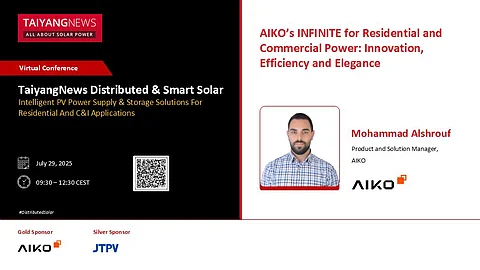

TaiyangNews has organized a Virtual Conference on Distributed & Smart Solar to explore the latest innovations, business models, and policy frameworks shaping the future of solar in the residential and commercial & industrial (C&I) sectors.
Mohammad Alshrouf, Product & Solution Manager at AIKO, will present on the topic AIKO’s INFINITE for Residential and Commercial Power: Innovation, Efficiency and Elegance at the conference.
The conference, which will also feature presentations from EUPD, LCP Delta, SolarPower Europe, JTPV, and Sigenergy, will take place on Tuesday, July 29, 2025, from 09:30 to 12:30 CEST. Register for free here.
Chinese perovskite company Auner has announced that it has achieved a power conversion efficiency of 30.46% with its perovskite/crystalline silicon tandem PV module based on the G12 half-cell format. The company says the results have been certified by the Fujian Institute of Metrology. IT added that this achievement surpasses its previous record of 29.69%, announced in May this year, for the exact module specification (see China Solar PV News Snippets).
Auner stated that it now possesses the complete set of technical capabilities required to initiate pilot-scale production of tandem modules. The next phase will focus on manufacturability testing for mass production.
Leading heterojunction (HJT) manufacturer Huasun has released a document titled “Kunlun Series HJT Solar Modules - Premium Choice for Vertical PV Projects.” The company claims to be the world’s first to provide comprehensive mapping from product R&D to industrial implementation of vertical PV systems based on HJT technology.
The document draws upon empirical data collected since 2023 from pilot projects in China, Germany, and other regions. Huasun highlights that vertical PV, thanks to its minimal land use and ‘dual-peak power generation curve’, is particularly suited for applications in agriculture and transportation. It is considered a potential solution to the conflict between land resource constraints and the need to expand PV installations. Huasun also notes that its high-bifaciality, high-efficiency HJT modules can further enhance the output curve of vertical PV systems, improving project return on investment.
Huasun claims to have commercialized nearly 100 MW of vertical agrivoltaic projects in Germany. Speaking with TaiyangNews at Intersolar Europe 2025, Huasun’s Christian Comes proposed an intelligent system design: east-west vertical module installations (see Vertical PV And Pre-commercial Tandem Modules From Huasun).
The IPO application of Zhejiang Jingyang Electromechanical Co., Ltd., a manufacturer of silicon ingot pulling equipment, has been rejected. The company’s main products include monocrystalline growth furnaces for the preparation of solar-grade silicon ingots. Jingyang filed for IPO in 2023, aiming to raise RMB 166 million (approx. $23.06 million) to fund the construction of 300 additional monocrystalline silicon growth furnaces annually, establish an R&D center, and supplement working capital.
With the prevailing overcapacity situation in the PV industry and the resultant weakened downstream demand, the company’s revenues decreased by 9.24% year-over-year (YoY) and net profit by 13.08%. In Q1 2025, its performance deteriorated further, with revenues and net profits plummeting 55.67% and 67.28% YoY, respectively.
According to a recent announcement by the Beijing Stock Exchange, Jingyang’s IPO application has been officially terminated.
China’s National Development and Reform Commission (NDRC) and the State Administration for Market Regulation (SAMR) have jointly released a draft amendment to the Price Law of China for public consultation. Although no specific industries are named, the revision is widely seen as a response to address the excessive ‘involution-style’ price competition in the solar PV sector.
The proposed amendments include:
Clearer definitions for identifying unfair pricing behaviors, such as refining criteria for low-price dumping to regulate market pricing and curb destructive competition.
Enhanced rules for identifying price collusion, price gouging, and discriminatory pricing.
Prohibiting public utilities, industry associations, and other entities from abusing influence or industry dominance to impose tied sales or mandatory service charges.
